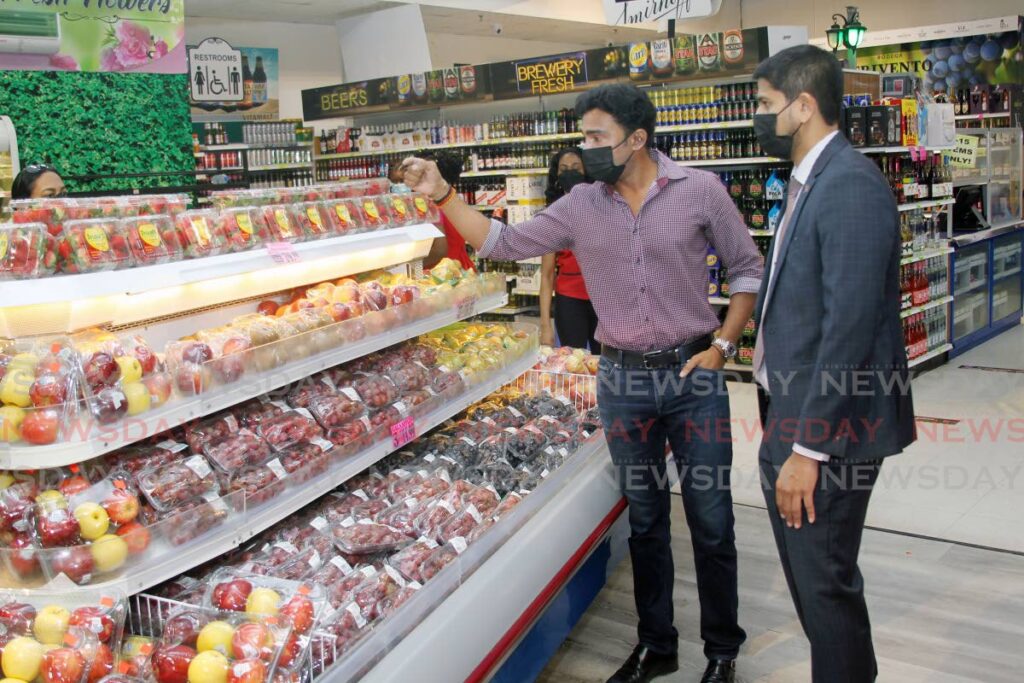Supermarket Association president: VAT removal no help to food bills

President of the Supermarket Association (SATT) said the removal of value-added tax (VAT) on basic food items would not make a difference in shoppers’ grocery bills given the latest round of price increases.
His comments came after the National Flour Mills and Nutrimix announced flour price increases in December, effective this week. Also in December, Kiss Baking Co Ltd said prices will be raised on its products this month. Earlier this week, Carib Brewery and Nestle raised prices on certain products; while chicken and livestock producers and distributors are expected to implement price hikes from Monday. Wholesale prices over a range of food products have gone up by four-22 per cent.
Diptee said, “From our perspective, and how that continues to impact prices on how we see them, it (VAT-removal) is not much help when you think about the core food basket.
“We should be trying to protect a class of customers that are the most vulnerable, and as a heavily import nation, there is very little that we in the industry can do. Customers want to know about now because it is now that it has the most adverse effect on them.”
On November 1, a list of food items became exempt from the 12.5 per cent VAT, as announced by Finance Minister Colm Imbert in the 2021-2022 budget presentation. Those items included a range of oils, cereals, coffee, teas, roti flour, milk, tinned meats and vegetables and juices.
Many of these products face price increases, such as flour and milk-based products. For example, while roti skin is VAT-free, the prices of roti flour supplied by NFM have been increased. Also, Nestle’s range of products include cereals, condensed milk, juices, coffees and teas. The company, however, has said some of its brands, both imported and locally produced, will incur price increases by single-digit percentages. It said its objective is to minimise the impact on consumers.
The Ministry of Finance in October sought to further clarify the VAT-free food list and stated that in the 2016 list the first broad category of food that was VAT free was “unprocessed food of a kind used for human consumption” and this classification allowed for all unprocessed vegetables, fruit, meat and fish to enter TT and be zero-rated.
It also added that several basic food items that are “processed” were identified on the list on a stand-alone basis as being zero-rated for VAT and these included sardines, corned beef, bread, flour, pasteurized milk and rice.
Diptee said supermarkets cannot replace fast-moving consumer goods with items that would stay for long periods, and as such TT would remain an import-dependent country.
He pointed out that there were opportunities for the Government to assist the agricultural sector, farmers and end-users to move away from import products that were costly to local substitutes.
“We have a lot of potential with arable lands, creation of our own industries, and agro-processing but we need to find the support,” Diptee said.
President of the Chaguanas Chamber of Industry and Commerce Richie Sookhai said apart from a lack of foreign exchange for trade in goods, the system has been set up in such a way to protect importers and to prevent the establishment of an effective a functioning agriculture sector.
Sookhai said, “There are some things that the Government should be able to put into place to protect the farmers and to protect the individuals who want to go into this industry. You have to think sometimes about if the system is set in such a way that it protects the importers for these foreign products that the local content can’t compete.”
He questioned the extent of the seriousness of food security for TT from its stakeholders.
The agriculture sector in the 2021-2022 budget was allocated $1.198 billion. Additionally, a $300 million stimulus package was announced, and other incentives included a guarantee that the State would buy local for state-funded programmes, like the School Feeding Programme and the provision of meals for public hospitals and the protective services; training and technical support for farmers to ensure international standards are maintained; and making local food more attractive.
In 2020, the sector was allocated $0.708 billion and an additional $500 million stimulus package.
VAT-free foods
• vegetable/soya bean oil, coconut oil, canola oil, ghee,
• peanut butter, black pepper and other spices, family cereal, cereals for children,
• hot cereal oats, milk substitute, condensed milk, instant coffee,
• ground coffee, steel-cut oats, black tea (3kg and under),
• green tea (3kg and under), orange juice, apple juice, still water (bottled water),
• seasoned meat, sausages (canned or otherwise packaged);
• canned tuna, canned mackerel, canned peas, canned peas, canned beans, canned corn, canned mixed vegetables, mayonnaise, ketchup,
• roti skin, soup (packaged), geera (crushed or ground), soya chunks, soya minced, ground dhal,
• cheese slices, table butter, pigtail, ham slices, turkey slices, chicken lunch meats, bologna, fresh juice and biscuits and crackers.

Comments
"Supermarket Association president: VAT removal no help to food bills"